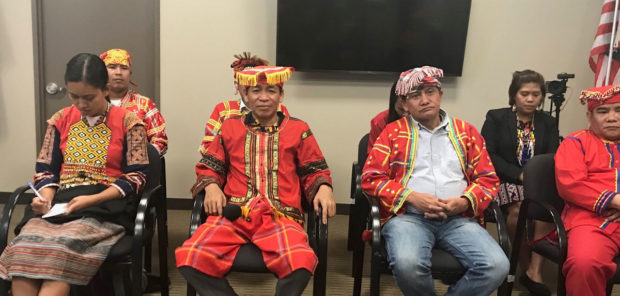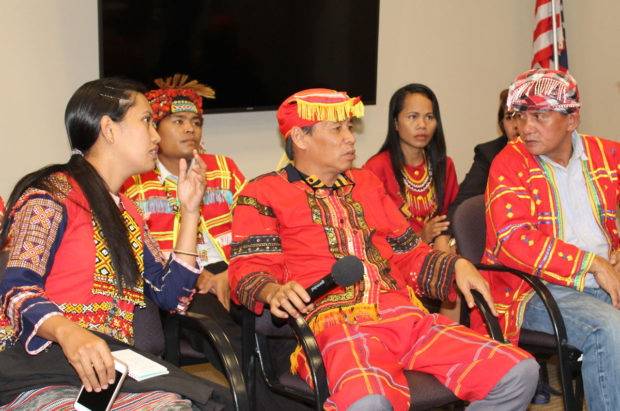Lumad U.S. Tour: Indigenous people trapped in crossfire

First Row (left to right, tribe affiliation in parentheses) Christine Banagan (Mandaya), Bawan Jacob Lanes (Mandaya Manobo), Datu Ramon Bayaan (Ubo Manobo), Datu Nestor Apas (Langilan Manobo). Second Row (left to right, tribe affiliation in italics) Joel Dahusay (Matig Talumo Manobo), Awing Apuga (Ata Manobo), Magdalina Iligan (Manobo), Chiary Balinan (Ata). PINOY/ Grace Garcia Szpytma
CHICAGO — One just cannot avoid feeling wretched when indigenous people fight against each other and become perpetual victims of the system that keeps them poor and disadvantaged.
Indigenous people have been caught in the crossfire of age-old armed conflicts in Mindanao involving secessionists, communist insurgents, private armies, and the Armed Forces of the Philippines. At the core of the conflict is the ownership of IPs ancestral domain.
In 1993, the National Unification Commission (NUC) submitted to President Fidel V. Ramos a report that identified “exploitation and marginalization of indigenous cultural communities, including lack of respect for and recognition of ancestral domain and indigenous legal and political system,” as one of the root causes of Philippine internal armed conflicts.
According to Bawan Jacob Lanes, a Mandaya Manobo, “the assertion part of our narrative of struggle touches the IP’s fight for recognition as a people with unique history, tradition, and culture. We have been ignored by the government for generations.”
In fact, the mountainous area of Mindanao where IPs live makes their access to government social services like education and health very difficult.
“Our ancestors, however, persisted in fighting to be recognized, respected, promoted, and protected. Finally, the government passed into law the Indigenous People’s Rights Act of 1997 (IPRA) which recognized the right of IPs to manage their ancestral domains,” Lanes added.

First row (left to right, tribe affiliation in parentheses): Christine Banagan (Mandaya), Bawan Jacob Lanes (Mandaya Manobo), Datu Ramon Bayaan (Ubo Manobo). Second row: Awing Apuga (Ata Manobo), Magdalina Iligan (Manobo) Chiary Balinan (Ata). PINOY/ Grace Garcia Szpytma
A delegation from the indigenous people (IP) (katutubong tribo) from Mindanao came to Chicago early July passionately sharing their culture and traditions and their so-called narrative of “Breaking the Silence: Telling the Truth. The Narrative of Struggle, Deception and Assertion of the Indigenous Peoples of the Philippines.” The delegation also visited other big cities in the US like New York and San Francisco.”
The delegation was accompanied by a communication team from the Presidential Communications Operations Office that handled their PowerPoint presentation and video documentation. Philippine Foreign Service Posts in the U.S. extended appropriate assistance to the IP delegation including organizing of community forums, lodging and touring members of the delegation to institutions of interest like the Field Museum in Chicago.
Winning hearts and minds of Fil-Ams
The delegation was unequivocal about their mission to win the hearts and minds of Fil-Ams. Its members shared their personal stories about alleged deception by the New People’s Army in recruiting members of their tribes and thereafter, imposing values not considered consistent with their customs and traditions. On the other hand, they also revealed that some of their tribe members joined paramilitary groups like ALAMARA or the Civilian Armed Forces Geographical Units (CAFGU).
CAFGU and paramilitary groups have been historically used by the Armed Forces of the Philippines as buffer forces in its counter-insurgency operations. The Philippine Commission on Human Rights in the past have issued grave concern about CAFGU’s abuses on innocent civilians resulting in the violation of human rights.
According to Wikipedia, “winning hearts and minds” refers to the strategy and programs used by the governments of Vietnam and the United States during the Vietnam War to win the popular support of the Vietnamese people and to help defeat the Viet Cong insurgency.
Bawan Jacob Lanes said that the delegation did not get any support from the government. However, the National Commission on Indigenous People (NCIP) was able to secure them the assistance of the Department of Foreign Affairs in their mission to break their silence and tell the truth.
The NCIP is the agency of the Philippine government responsible for protecting the rights of the IPs. Indeed, Datu Ramon Bayaan, an Ubo Manobo, appealed to Fil-Ams to end support to the communist fronts in the U.S. He said, “We are here to tell the truth. The CPP-NPA-NDF are the terrorists, not the Armed Forces of the Philippines.”
However, according to Amnesty International and local human rights groups, the Armed Forces of the Philippines and paramilitary groups continue to commit human rights violations and other crimes in the name of anti-communism. Some people in the community forum also expressed skepticism as they heard different stories from other displaced IPs.
What is sad in the stories of the IPs is the failure of the current and previous regimes to address the root cause of armed conflicts in Mindanao, especially in the tribal areas.
The irony of it all, despite the passage of IPRA, IPs still suffer from discrimination and are considered one of the poorest minority groups in the world. According to the United Nations State of the World’s Indigenous Peoples, the Philippines is one of the countries that facilitated large-scale mining by foreign corporations and other destructive projects, displacing many IP communities from their ancestral lands.

